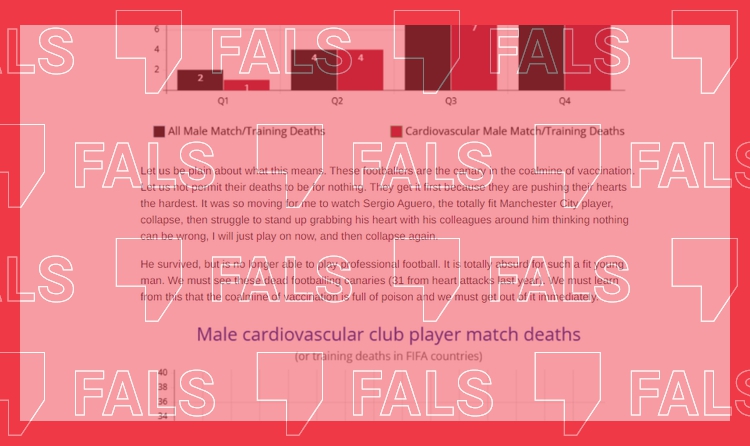Cardiovascular deaths among professional athletes did not double every three months in 2021 as a result of the vaccine

These days it’s hard not to stumble upon videos on the internet in which a …

These days it’s hard not to stumble upon videos on the internet in which a person who is in the middle of exercising suddenly collapses and falls to the floor. Usually, there’s an accompanying text in which the person sharing the video assures viewers that what they have just witnessed is a “clear case of ‘repentinitis’”: an ironic way for people in the Spanish-speaking world to refer to those who suddenly drop dead while working out (“repente” means “sudden” in Spanish). The latest article to bring up these supposed accidents is one you shared with us in which it states that “cardiovascular deaths among professional athletes doubled every three months over the course of 2021” as a result of the vaccines. These data are FALSE: there is no scientific evidence to date that the vaccines have caused an increase in the number of cardiovascular deaths among elite athletes. What we do have to bear in mind is that a fever, whether caused by a viral infection or any vaccine (covid-19 or not), increases the risk of dehydration, which can affect (Spanish only) the proper functioning of the body’s organs.
Cardiovascular deaths among professional athletes doubled every three months over the course of 2021. […] These football players are ‘a warning’ against the vaccination.
In reality, the article is a synthesis in Spanish of an article published by an English-language media site aimed at spreading misinformation, whose content we have talked about before (Spanish only) in relation to alleged cardiovascular deaths caused by the vaccines.
On this occasion, the focus is on the alleged sudden deaths of athletes due to the Pfizer vaccine. In the article, written by someone who goes by the handle “a concerned citizen”, the author notes that “cardiovascular deaths among professional athletes doubled every three months over the course of 2021”, which they consider a “warning against the vaccination”.
However, no official reports have detected an increase in deaths due to cardiovascular problems among elite athletes. “We at the Consejo Superior del Deporte (Spanish National Sports Council) have been monitoring all the athletes who competed in the 2020 Olympic Games in Tokyo [which actually took place in 2021], whose participation required them to be vaccinated, and we haven’t observed any complications”, commented Araceli Boraita, coordinator of the Sports Cardiology working group of the Spanish Society for Cardiology (Sociedad Española de Cardiología, or SEC). “Some people did report side effects, especially after the second dose, including malaise, muscle pains, feverishness,… but they only lasted two or three days and they resolved themselves”, she concluded.
No other organisations dedicated to monitoring elite athletes have detected an increase in cardiac problems among athletes due to the vaccine, either. FIFA, for example, had already explained to Reuters that they were “not aware of a rise in episodes of cardiac arrests” and that “no cases have been flagged in relation to individuals receiving a covid vaccine”. And, they added, “generally speaking, FIFA is in regular contact with leading research centres and experts to do research on a variety of medical topics”.
Myocarditis in athletes
At present, the pharmacovigilance organisations tasked with monitoring the safety of the vaccines have only found two heart conditions that can be caused by the mRNA vaccines: pericarditis (Spanish only) and myocarditis. We have already explained that these are very rare adverse side effects (between 1 and 10 cases in every 100,000 vaccinated people) (Spanish only), which occur more frequently in young men under 30 and, in most cases, after the second dose.
In any case, the experts previously consulted by Verificat on this matter indicate that, in the vast majority of the already rare cases of myocarditis in young people, the cases are mild and clear up in a few days: “Typically, a patient will recover quickly and not have any lasting effects”, notes José Alberto García Lledó, spokesperson for the Spanish Society for Cardiology (SEC), in this article (Spanish only). Additionally, myocarditis can also affect the pericardium (the outer protective layer of the heart). On those occasions, which are very uncommon, “the patient experiences pain similar to angina pectoris and, in that case, which is easier to diagnose and not usually associated with